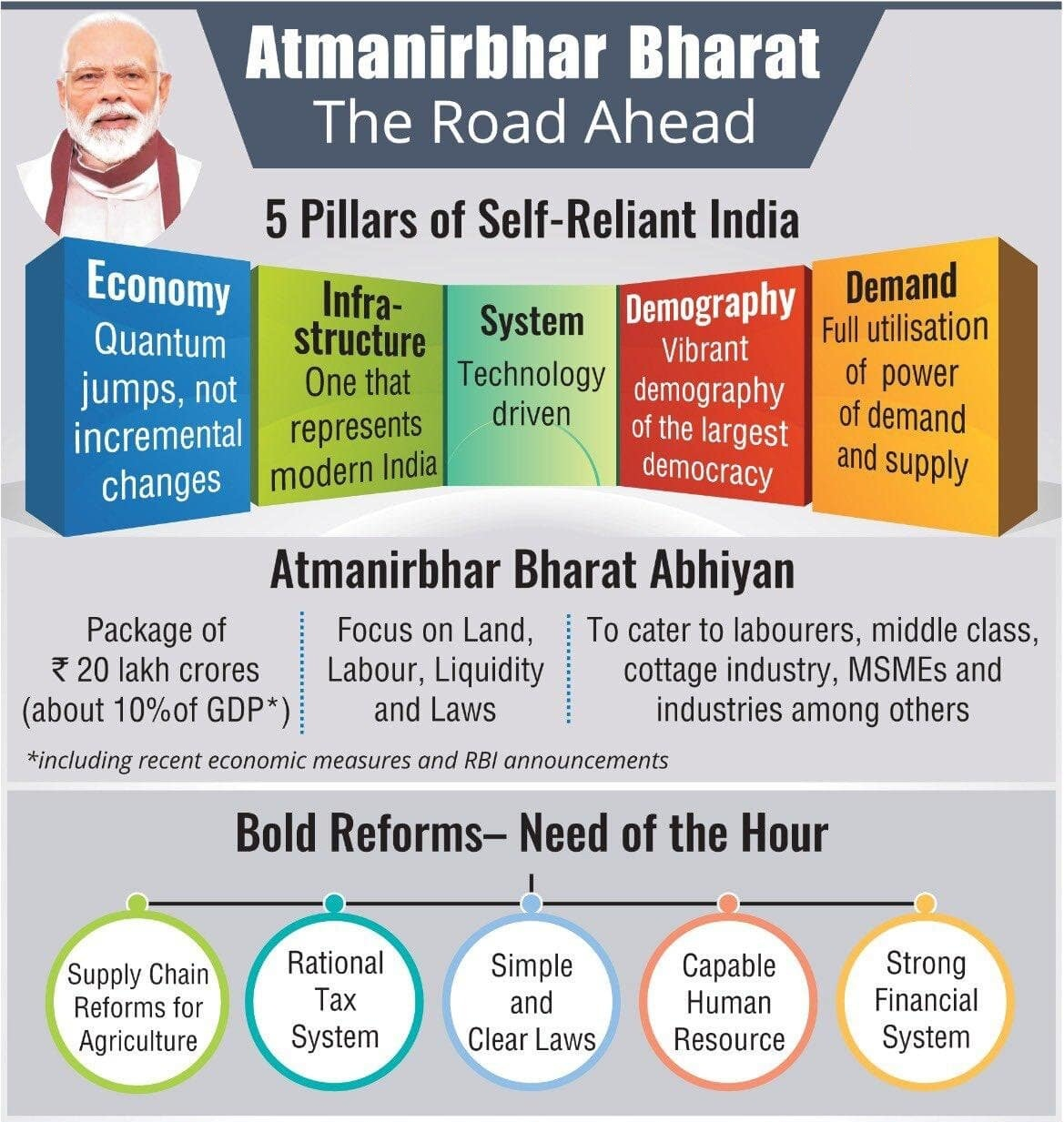Indian Economy
Atmanirbhar Bharat: Concerns
- 07 Jul 2021
- 7 min read
Why in News
The UK India Business Council (UKIBC) has released a report titled ‘Road to a UK-India Free Trade Agreement: Enhancing the Partnership and Achieving Self-reliance’.
- According to the UKIBC annual Survey on Doing Business in India, 77% of UK companies believe that the Atmanirbhar Bharat campaign is an “opportunity” rather than a challenge.
- However, the council emphasized that some of the reforms under the self reliant programme could have negative consequences for the UK and all multinational companies.
Key Points
- Opportunity Offered by Atmanirbhar Abhiyan:
- The programme should be viewed as an extension of the “Make in India” campaign, launched in 2014, as they share the aim of securing manufacturing investments from domestic and international business.
- The package offered a range of financial support measures for the weaker sections of India’s society, for micro, small and medium sized enterprises (MSMEs), and for the agriculture sector, creating fair market platforms, easing rules for businesses and a range of other solutions to support the economy.
- The campaign has opened up several sectors for foreign investors, including defence, atomic energy, agriculture, insurance, healthcare and civil aviation.
- Concern Raised:
- Curtail International Trade and Investment: Certain aspects of the programme have the potential to curtail international trade and investment, such as increased tariffs, non-tariff restrictions on imports, and import substitution.
- Non-tariff Barrier is a trade restriction, such as a quota, embargo or sanction, that countries use to further their political and economic goals.
- Countries can use non tariff barriers in place of, or in conjunction with, standard tariff barriers (like Custom Duty).
- Ad-hoc Policy Change by DISCOMS: DISCOMS- power distribution companies- adopt to ad-hoc changes to renegotiate power purchase agreements in case of renewable energy sector.
- Policy Issues: Difficulties in India’s Intellectual Property enforcement regime, gaps in pharma sector regulations, drug price controls, and norms related to data localisation and governance.
- Data localisation (i.e. storing data within the boundaries of the country) may restrict the ability of local companies to compete in the global marketplace by limiting access to the global supply chain.
- This isolation may result in reduced investment and access to capital and customers.
- In Space Sector: To open the Space sector to private investors was a significant step but there was, however, a ‘lack of clarity’ about several aspects related to the procedures.
- Indian National Space Promotion and Authorization Centre (IN-SPACe) provides a level playing field for private companies to use Indian space infrastructure.
- In Defence Sector: The import embargo on the 101 items of defence equipment is planned to be implemented over a period of four years until 2024.
- Also changes in the Defence Acquisition Procedure (DAP) 2020 are expected to ensure that no item in this list is imported beyond the cut-off date.
- This may impact foreign investment in India.
- Curtail International Trade and Investment: Certain aspects of the programme have the potential to curtail international trade and investment, such as increased tariffs, non-tariff restrictions on imports, and import substitution.
- Suggestion:
- Build a Strategy for the Future:
- A long term approach that considers regional supply chains and location decision-making is needed to succeed.
- India Should Become Increasingly Open to Free and Fair Trade:
- India should attract investors due to its strengths rather than by using tariffs as a tool to push international businesses to invest and make in India.
- Focus on Developing and Supporting Innovators:
- Focus on STEM, digital, creative and critical thinking skills that will build leaders and workers who can innovate and solve problems.
- India should also develop an innovator-friendly intellectual property policy and enforcement regime.
- Digital and Data:
- With digital and data services increasingly important in global trade, there is an opportunity for India to fully integrate with other major democratic markets.
- India should continue to harness and actively invest in the opportunities that Artificial Intelligence, digital technology and data present to achieve its growth potential.
- Put Sustainability at the Center of India’s Trade and Investment Strategy:
- If shaped properly, trading arrangements can help support the poor and protect the environment.
- Countries and trade blocs are cognisant of this fact and are increasingly integrating sustainability and human rights into their trade agreements and strategies.
- Build a Strategy for the Future:
Atmanirbhar Bharat Programme
- The programme was launched by the Prime Minister in May 2020 with an economic stimulus package - worth Rs 20 lakh crores aimed towards achieving self-reliance.
- The announced economic package was 10% of India’s Gross Domestic Product (GDP) in 2019-20.
- The amount includes packages already announced at the beginning of the lockdown incorporating measures from the RBI and the payouts under the Pradhan Mantri Garib Kalyan Yojana.
- The package is expected to focus on land, labour, liquidity and laws.
- Aims:
- It aims towards cutting down import dependence by focussing on substitution while improving safety compliance and quality goods to gain global market share.
- The Self-Reliance neither signifies any exclusionary or isolationist strategies but involves creation of a helping hand to the whole world.
- The Mission focuses on the importance of promoting “local” products.





